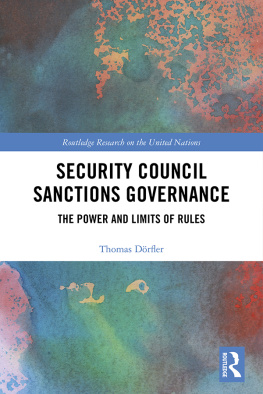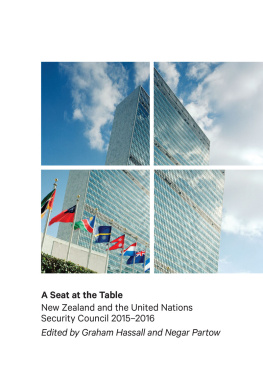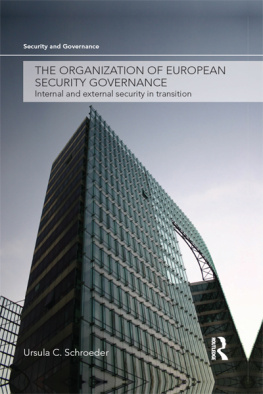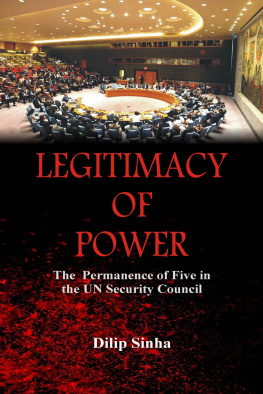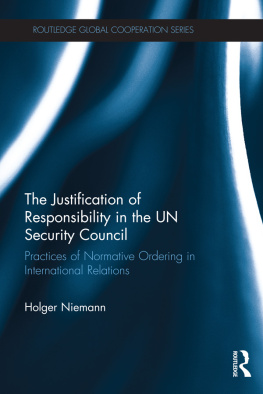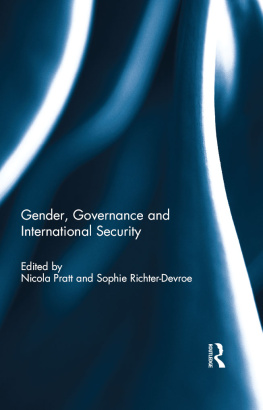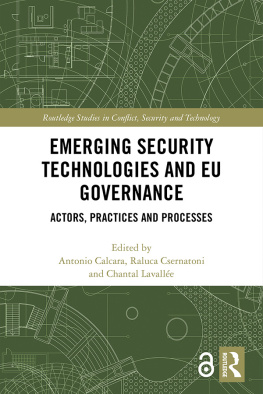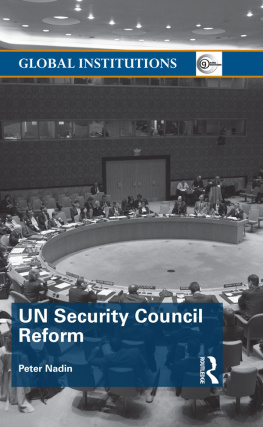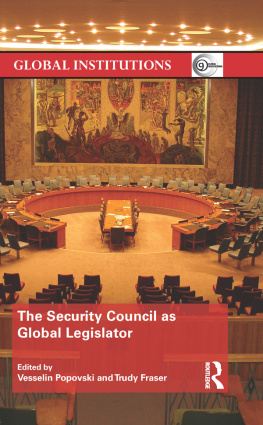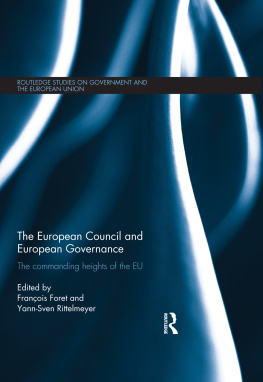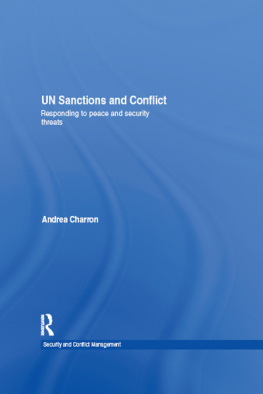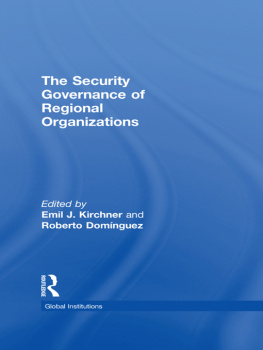Security Council Sanctions Governance
Little is known about how far-reaching decisions in UN Security Council sanctions committees are made. Developing a novel committee governance concept and using examples drawn from sanctions imposed on Iraq, Al-Qaida, Congo, Sudan and Iran, this book shows that Council members tend to follow the will of the powerful, whereas sanctions committee members often decide according to the rules. This is surprising since both Council and committees are staffed by the same member states.
Offering a fascinating account of Security Council micro-politics and decision-making processes on sanctions, this rigorous comparative and theory-driven analysis treats the Council and its sanctions committees as distinguishable entities that may differ in decision practice despite having the same members. Drawing extensively on primary documents, diplomatic cables, well-informed press coverage, reports by close observers and extensive interviews with committee members, Council diplomats and sanctions experts, it contrasts with the conventional wisdom on decision-making within these bodies, which suggests that the powerful permanent members would not accept rule-based decisions against their interests.
This book will be of interest to policy practitioners and scholars working in the broad field of international organizations and international relations theory as well as those specializing in sanctions, international law, the Security Council and counter-terrorism.
Thomas Drfler holds a PhD in Political Science from the University of Bamberg, Germany, and a Masters Degree from Leiden University, The Netherlands. He has been a Japan Society for the Promotion of Science (JSPS)-UNU Postdoctoral Research Fellow with the UNU Centre for Policy Research, a visiting scholar at John-Jay College of Criminal Justice (City University of New York) and a consultant for the Security Council Affairs Division of the UN Secretariat. Most recently, he held a post-doctoral position at the Technical University Munich, Germany, TUM School of Governance and will shortly be taking up a research fellow position at the University of Potsdam, Germany. Thomas has published in academic journals including Regulation & Governance, Global Governance, Journal of International Relations and Development, Terrorism & Political Violence, Journal of Economic Policy Reform, as well as several chapters in edited volumes and policy-relevant articles. For his work on UN sanctions, he has received the 2018 Hans-Lwel-Prize and the 2017 Award of the UN Association of Germany.
Routledge Research on the United Nations
Chairing Multilateral Negotiations
The Case of the United Nations
Spyros Blavoukos and Dimitris Bourantonis
Individual Agency and Policy Change at the United Nations
The People of the United Nations
Ingvild Bode
Reforming UN Decision-Making Procedures
Promoting a Deliberative System for Global Peace and Security
Daniel Niemetz Martin
The UN International Criminal Tribunals
Transition without Justice?
Klaus Bachmann and Aleksandar Fati
Norm Change in International Relations
Linked Ecologies in UN Peacekeeping Operations
John Karlsrud
Security Council Sanctions Governance
The Power and Limits of Rules
Thomas Drfler
Security Council Sanctions Governance
The Power and Limits of Rules
Thomas Drfler
First published 2019
by Routledge
2 Park Square, Milton Park, Abingdon, Oxon OX14 4RN
and by Routledge
52 Vanderbilt Avenue, New York, NY 10017
Routledge is an imprint of the Taylor & Francis Group, an informa business
2019 Thomas Drfler
The right of Thomas Drfler to be identified as author of this work has been asserted by him in accordance with sections 77 and 78 of the Copyright, Designs and Patents Act 1988.
All rights reserved. No part of this book may be reprinted or reproduced or utilized in any form or by any electronic, mechanical, or other means, now known or hereafter invented, including photocopying and recording, or in any information storage or retrieval system, without permission in writing from the publishers.
Trademark notice: Product or corporate names may be trademarks or registered trademarks, and are used only for identification and explanation without intent to infringe.
British Library Cataloguing-in-Publication Data
A catalogue record for this book is available from the British Library
Library of Congress Cataloging-in-Publication Data
A catalog record has been requested for this book
ISBN: 978-1-138-33749-7 (hbk)
ISBN: 978-0-429-44232-2 (ebk)
Typeset in Times New Roman
by Wearset Ltd, Boldon, Tyne and Wear
Contents
This book on committee governance in the Security Council would not have been possible without the tremendous financial and institutional support I have received in Bamberg, New York and Tokyo over the course of this project. This includes the Bamberg Graduate School of Social Sciences (German Excellence Initiative), to which I owe my doctoral education in research design and methods. The German Foundation for Peace Research provided invaluable support through their funding of a pilot study The Al-Qaida/Taliban Sanctions Committees (KA001/12-Nr.13/50-2011) and a research project Rule-based Decision-making through Complex Governance Structures? (PA003/13-Nr.02/12-2012). I would also like to thank the University of Bayern e.V. and the Elite Network Bavaria for supporting my research with a full PhD scholarship. I am grateful for the German Academic Exchange Service travel grant in support of my field research. I also kindly acknowledge the generous financial support of the Japan Society for the Promotion of Science as a JSPS-UNU Postdoctoral Fellow.
This book would also not have been published without the dedicated support of many individuals. First and foremost, I would very much like to thank the members of my dissertation committee, Thomas Gehring, Monika Heupel and Thomas Rixen, who have been truly inspiring but challenging supervisors. Your commentary, ideas and advice were integral for improving the manuscript and shaping it in ways that I could not have imagined. I would also like to thank Thomas Saalfeld, and Miriam Schneider of the BAGSS for their invaluable support. I owe much to Peter Romaniuk, Charles Strozier and Hammad Sheikh of the Center on Terrorism at John Jay College of Criminal Justice for hosting me during my field research. I am indebted to my former colleagues at UNU-CPR, David Malone, Sebastian von Einsiedel, Rebecca Brubaker, Lee Schrader, and Basilio Valdehuesa, who greatly supported this endeavor and gave me the autonomy I needed to complete the project. I very much appreciate the huge support and encouragement of Anita Mathur, Thomas Heimgartner, and Dana Baikenzhina at the UN Secretariat, who hosted me at the Security Council Practices and Charter Research Branch and opened a new perspective on committee governance without which the book would have been quite different. I am grateful for the support of Yasuhiro Ueki of Sophia University for being an inspiring and patient host researcher and Mari Otaki for her outstanding administrative support. I would also like to thank the discussants and commentators at various conferences and workshops where I presented parts of this book project, including, but not limited to Thomas Biersteker, Michael Brzoska, Tine Hanrieder, George Lopez, Clara Portela, Kimberly Prost, Bob Reinalda, Christian von Soest, Etel Solingen, Marcos Tourinho, Peter Wallensteen, and Oliver Westerwinter. I would also like to thank the numerous interviewees, government and international organization officials, who provided indispensable insights into Security Council committee governance, conducted in three trips to New York in 2012, 2013 and 2016.


